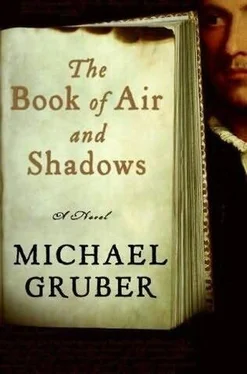And here I am. Perhaps it’s time for a summing-up, but what should it be? Unlike Dick Bracegirdle, I am a modern man and thus further than he was from moral truth. My mind is still reeling from my interview with my father. Could what he said possibly have been true? Who could I ask? Not my siblings. Miriam would not know the truth if it bit her on her liposuctioned ass and Paul…I suppose Paul thinks he has a professional commitment with the truth but he is also in service to a Higher Truth, and people in such service are often inclined to lie like bastards when defending same. What if everything I thought about my past was wrong? What if I am a kind of fictional character, fed with lies for the purposes of others, or maybe for no purpose at all, or for sadistic amusement? Being alone, having no social function just now, aggravates this feeling of unreality, or incipient madness. Perhaps I will start to hallucinate, whatever hallucinations are. Although feeling one is going mad is supposedly a sign one is not. If you really go crazy, everything makes perfect sense.
What is the ground of reality then, once you admit mnemonic forgery? When I consider this question I have to think of Amalie. As far as I know, Amalie has never told a serious lie in her life. I mean, I believe she would lie to save someone, like to the Gestapo about a hidden fugitive, otherwise not. But it turns out that if you consistently lie to someone like that, they sort of have to withdraw their function as the foundation of your reality, like a little snail pulling in its horns, leaving you adrift in a dense and opaque gas of fiction. It’s not intentional on their part, it’s an aspect of the underlying physics of the moral universe. And so, thus adrift, I naturally produce nothing but more fiction. I am a lawyer and what is a lawyer but someone hired to produce a work of fiction, which, in court, will be compared with opposing counsel’s work of fiction by a judge or jury, and they will decide which fiction most closely resembles the fictional picture of the world in their respective brains and decide for one or another side and thus is justice done. And in private life, I will continue to dream up people to play in the continuing tedious novel of my existence, Miranda, for example, as the Ultimately Satisfying Mate (and by God I am still thinking about her, wanting her, that phantasm) and Mickey Haas as the Best Friend.
Well, in themidst of this sorry maundering, my sister just called. Reception is quite good here, for there is a tower right on the property, artfully painted to resemble the trunk of a pine. Here is how plans break down. My father had stashed her and my children in an apartment known only to himself, and what did she do but journey from that apartment to her own apartment on Sutton Place to get some clothes and other things, her Botox perhaps, and she took the kids along with her because they were getting so bored with being cooped up and needless to say some of Shvanov’s people were waiting for her there and they took the kids. So the quasi-fictional kidnapping is now a real one. This occurred early this morning and they tied her up, and it was only the cleaning person’s arrival that released her. My sister is not really that stupid, but she does like to look her best.
I did not expect this part of it. But I did and do expect the imminent arrival of various parties to l’affaire Bracegirdle. Mickey will come, because he wants to complete the last part of his marvelous scam, but he will not come alone. I am trying, for the record, to recall when I first understood that Mickey was himself the tertium quid we had discussed, the link between Bulstrode and Shvanov. The mind assembles bits of information in its own time and then the revelation. I can’t imagine why I did not immediately see this. Who else could it be? Maybe it was when Oliver March told us the story about how Mickey had treated poor Bulstrode or maybe it was when I learned that Shvanov was a loan shark who had done well out of the market crash, lending money to rich assholes suddenly illiquid. And is not Mickey a rich asshole with money problems? And did I imagine that his wives, in the midst of the sort of arguments Mickey always got into with his wives, would not have, as a sort of marital nuclear strike, confront him with the fact that I had screwed them all, and would that not make him hate me and plan some terrible revenge? Why didn’t I think of all this? Because I had dreamed him up as the Best Friend, of course. The Confidant.
I also must have known at some deep level after our meeting with the forger Pascoe that there was only one person in my ambit who could have come up with the scam he was hired to assist, the world’s premier Shakespeare expert, the only person who had connections with Shvanov, with Bulstrode, with Jake “The Schmuck” Mishkin. He is about to take a bunch of Jewish gangsters for many millions of dollars, and I rather doubt that I can do anything to stop him. In a strange way, he’s like my father: When Izzy says the numbers add up, no one can doubt him. When Mickey says it’s Shakespeare, ditto.
The question remains why I came up to his place in the country rather than really hiding out in one of the zillion anonymous and untraceable places available to a man with a supply of ready cash. Because I am tired of this. I want to be real. I don’t care very much if they kill me but I do want to emerge into the realm of truth before that. Very noble sentiment, Mishkin, but there is one other reason. I realized quite recently that the picture that Miranda presented to me-her hairstyle, her dress, her whole aspect-was designed to be as much like my wife when I first met her as it was possible to contrive. That was what knocked me off my admittedly not very secure perch, that was the inside curveball. And who knew what that distant girl was like, who had seen her innumerable times back then, who had heard from my very lips just what turned me on about her? Why the Best Friend, of course. God, this is banal. Any halfway intelligent future reader of this will have seen it coming long before I did, but isn’t that true to nature, don’t we see everyone else’s secrets but our own, the mote in our brother’s eye? Yes, good old Mickey set me up, and God help me, I hope that as part of his revenge he brings her along. I would like to see her one more time.
On the subway, Crosetti could hardly stop laughing to himself, and not entirely to himself, which drew looks from the others in the car. A woman with two small kids in tow changed her seat. Laughing because there he was back on the subway after some weeks of living the high life, private jets and five-star hotels and everything paid for, and having just dropped off what was essentially the budget of Titanic . The ten grand, or maybe even the fifty, would help, though, if he ever got it. No, Mishkin would pay. He was a sleazebag, but not that kind of sleazebag. The money would mean that he could take some time off, work on his screenplay, and, with his savings, just about get through NYU film school.
So he was actually feeling fairly good when he walked into his mother’s house and was unpleasantly surprised by the reception he got. Mary Peg, it turned out, had wanted to see the thing and was outraged that her gormless son had again parted with a treasure, and beyond that, she had told Fanny Dubrowicz that it had been found and she of course was vibrating with anticipation. Fruitlessly did Crosetti explain that at least two independent criminal gangs were searching for it too, and that it was at present about as comfortable an object as an armed nuclear bomb, and in any case Mishkin had paid all the expenses for its recovery and provided protection, in the absence of which he might not have found it at all or, if he had, might at this moment be dead in a shallow English grave.
Читать дальше












